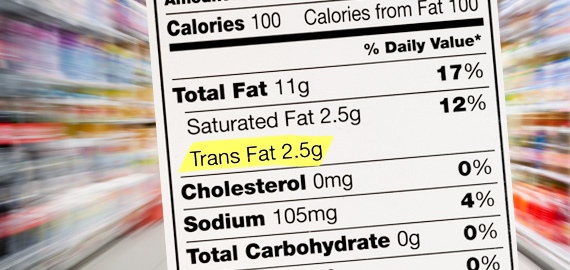
Written By: Christina Newberry
Reviewed By: Gloria Tsang, RD
Title: Registered Dietitian
Last Updated on:

You probably know that trans fats are bad for you: They raise your LDL (bad) cholesterol and can increase your risk of heart disease or stroke. Some countries have already banned them. In the United States, trans fats were not even required to be listed on product labels until 2006. Now, just seven years later, the U.S. Food and Drug Administration (FDA) is moving to phase artificial trans fats out from packaged foods sold in the United States.

Table of Contents
Artificial trans fats are created when hydrogen is added to liquid vegetable oils (a process called hydrogenation). This improves the shelf life of the oils, which otherwise are not heat stable and can go rancid quickly – meaning hydrogenation is especially important in processed foods. Partially hydrogenated oils are the primary source of artificial trans fats in the American diet.
The American Heart Association (AHA) recommends a maximum of 2 g of trans fats per day – but that number includes naturally occurring trans fats, which are found in small amounts in milk and meat. The AHA guideline says, “Given the amount of naturally occurring trans fats you probably eat every day, this leaves virtually no room at all for industrially manufactured trans fats.”
If you think your diet is trans-fat-free because you check labels and never buy foods that list trans fats, think again. Food labels with less than 0.5 g trans fat per serving can show it as zero. Any food product that lists partially hydrogenated oil on the label contains trans fats.
This month, the FDA announced it has made a preliminary determination that partially hydrogenated oils, as the primary source of artificial trans fats in processed foods, are not “generally recognized as safe.”
If that determination is finalized, partially hydrogenated oils will be considered food additives rather than just ingredients. That means they will no longer be allowed in foods without authorization. Manufacturers will be given a specific time period to change their formulations and phase out partially hydrogenated oils.
According to the FDA, this could prevent 20,000 heart attacks and 7,000 deaths from heart attacks every year.
For now, there is no change to the regulations – but that change could be coming soon. In the meantime, check the Nutrition Facts panel on all packaged foods to check the trans fat content. Even if the label lists zero trans fat, remember that the product does contain some trans fat if it lists partially hydrogenated oils as ingredients.
Alumni: University of Victoria – Christina Newberry is a writer and editor whose work has appeared in national and local magazines and newspapers. With a Bachelor’s degree in English and Anthropology from the University of Victoria and a Journalism Certificate from Langara College, Christina brings keen curiosity and the love of a good story to her work with HealthCastle.com.
Christina is a passionate traveler and urban gardener with an interest in vegetarian eating and making good, tasty food from scratch. Sharing lessons learned from her own experiences, Christina writes about lifestyle topics for HealthCastle, with a focus on eating well at home and on the road.
cholesterol, heart smart, hydrogenated oil, nutritional labels, trans fat